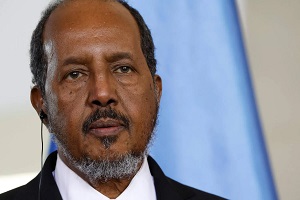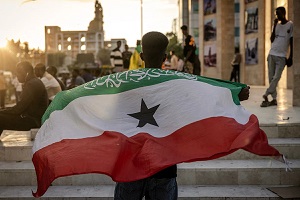Arab Barometer V
Jordan Country Report
Jordan Vista
Arab Barometer – Wave V
Country Report – Jordan
Executive summary
Jordan’s existing social contract has run its course. As the data shows, the current system is unsustainable. Trust in political institutions is in steep decline across the board - including government, parliament and even the judiciary. Jordanians have lost a sense of political possibility, and the future looks bleak. Systemicpolitical change is unlikely as trust in security institutions remain high, but the status quo is unquestionably unsustainable. Government should be proactive, rather than reactive in facing this challenge.
Nearly all Jordanians believe the economy or corruption are the top challenges facing the country, and nearly all say corruption is rampant. Many do not believe the government is addressing these challenges adequately, and satisfaction with government performance is lower than any time over the last decade. Citizens are particularly frustrated with the government’s efforts to create jobs and and limit inflation.
As a result, almost half of all Jordanians are considering emigrating. That figure has doubled over the last two years. The poor economic conditions and stymied political process have combined to produce this lethal waive of pessimism and desire to leave the country, particularly among the educated youth. Most potential migrants wish to go to North America and the GCC.
These are among the key findings from a nationally representative public opinion survey conducted in Jordan by the Arab Barometer in October-November 2018. The survey conducted 2,400 face-to-face interviews in the respondent’s place of residence has a margin of error of ±2 percent and had a response rate of 81 percent
Economic Conditions
Jordanians are united on the main challenge facing their country. An overwhelming majority plurality (71 percent) say economic issues are the primary issue, followed by corruption (17 percent). These two challenges are the primary issues for nearly all Jordanians (88 percent).
What is the most important challenge facing your country today?
Overall, just under a quarter (23 percent) rate the economy as good or very good, which is a dramatic decline from 2016 (-23 points). This may be due to several factors, including the decline in global refugee aid, the decline in foreign aid for the government, and the prolonged impact of government austerity measures.
2018 appears to be a significant departure from trend data - as positive ratings of the economy were between 45 and 55 percent between 2006 and 2016.
How would you evaluate the current economic situation in your country?
% saying the current economy is very good or good
About a third of Jordanians expect economic conditions to improve in the near
future, which is consonant with previous surveys. Educated Jordanians are slightly
more pessimistic than their less educated counterparts, with 29 percent of those
with higher education saying the economy will be better in 2-3 years compared
to 25 percent of those with secondary education and 37 percent of those with
basic education.
Corruption
Corruption remains a significant challenge for Jordan. Almost all Jordanians (89 percent) say that corruption is found within state institutions to a large or medium extent. This percentage has increased by ten percentage points since 2016, from 79 percent to 89 percent. Perceptions of corruption are all groups.
To what extent do you think that there is corruption within the national state agencies and institutions in your country?
Moreover, a minority of Jordanians believe that the government is taking significant steps to tackle the problem. Slightly less than half (45 percent) say the government is cracking down on corruption to a great or medium extent, which is down 10 points since 2016, but similar to 2013 (45 percent).
In your opinion, to what extent is the national government working to crackdown on corruption?
% saying to a large or medium extent.
Educated Jordanians are the least likely to believe the state is serious about tackling corruption. Just a third (34 percent) of those with higher education say the government is doing so, while those those with basic education are 20 points more likely to say the same. Meanwhile, males (39 percent), those with
a higher income (38 percent), and residents of the South (37 percent) are less likely to think the government is addressing the issue than their female, lower income, Northern counterparts.
Institutional Trust and Government Performance Trust metrics in Jordan are down across the board, but especially with regards to political institutions. Jordanians are far less likely to trust the government than
in previous waves. A little more than one third (38 percent) have a great deal or quite a lot of trust in the government. This figure is almost half what it was in 2010 (72 percent), since it began declining with every consecutive wave (64 percent in 2012, 54 percent in 2016).
I’m going to name a number of institutions. For each one, please tell me
how much trust you have in them: Government
Trust is lower among the better educated. Those with a basic level of education (43 percent) are more likely to have confidence in the government than those with a university degree (34 percent) or secondary degree (37 percent).
Jordanians are also increasingly less satisfied with government performance. About a third of Jordanians (32 percent) said they are satisfied with government performance, compared to half in 2006 and 2010. Satisfaction is particularly low in the realms of job creation (14 percent) and controlling inflation (12 percent).
On a scale from 0-10, to what extent are you satisfied with the current governments performance? (0 = dissatisfied; 10 = satisfied) % placing themselves at 6 or higher.
Trust in parliament has also witnessed a staggering decline. Only one-in-seven (14 percent) have a great deal or some trust in parliament, compared with 16 percent who say little trust and two thirds (68 percent) who say no trust. Trust has declined substantially since 2006, when 55 percent had at least some confidence in the legislature. Trust in parliament has declined with every wave since
2006 (46 percent in 2010, 44 percent in 2012, 26 percent in 2016).
I’m going to name a number of institutions. For each one, please tell me how much trust you have in them: Parliament
A similar percentage have confidence in the Muslim Brotherhood (14 percent), whereas trust in political parties is at 7 percent. Those with a higher level of education are about 2.5 times more likely to trust political parties than those with basic education (10 percent vs. 4 percent).
Moreover, trust in the judiciary is not what it used to be. In 2010 82 percent trusted the judiciary, whereas in 2018 it is 65 percent did in 2016. I’m going to name a number of institutions. For each one, please tell me how much trust you have in them: The judiciary
Levels of trust are significantly higher in institutions that are tasked with ensuring law and order. Almost all Jordanians (95 percent) trust the army and the police (90 percent). These percentages are the highest in the region.
I’m going to name a number of institutions. For each one, please tell me how much trust you have in them.
% saying they have a great deal or quite a lot of trust.
Migration
Jordanians are twice as likely to want to emigrate than they were in 2016. Now, fully 45 percent say they want to leave their homeland, which is a 23-point increase since the 2016 survey. Notably, this also reverses a trend where the percentage wanting to emigrate was decreasing from 34 percent in 2010 to
22 percent in 2016.
Migration is strongly linked with age – 59 percent of those ages 18-29 want to leave Jordan, compared with less than half (46 percent) of those 30-39, 39 percent 40-49, 31 percent of those 50-59 and 16 percent who are sixty or older.
Jordan is at significant risk of brain drain as well as a majority of those with a university degree want to leave their homeland. Men are far more likely to want to emigrate than women (53 percent vs. 36 percent).
Have you ever thought about emigrating from your country?
More than four-in-five Jordanians who wish to migrate cite economic considerations (83 percent) as their main reason. The remaining 17 percent are scattered across different reasons.
People want to emigrate for different reasons. Why have you thought about emigrating?
Potential migrants are most likely to look to go to North America (40 percent) or the GCC (31 percent). Meanwhile, 16 percent want to go to Europe while 9 per cent want to go to a non-GCC Arab country. Additionally, 22 percent prefer another destination including sub-Saharan Africa, Asia or Latin America. Notably, a vast majority of potential migrants (82 percent) say they would not migrate illegally compared with only 18 percent who say they would consider leaving even if they lacked the necessary papers.
About Arab Barometer
The Arab Barometer is a nonpartisan research network that provides insights into the social, political, and economic attitudes and values of ordinary citizens across the Arab world.
We have been conducting rigorous, and nationally representative face-to-face public opinion surveys on probability samples of the adult populations across the Arab world since 2006. The margin of error is ±3 percent.
The Arab Barometer is the largest repository of publicly available data on the views of men and women in the MENA region. Our findings give a voice to the needs and concerns of Arab publics
Latest News
-
 Trump says 'hell to pay' if Hamas fails to disarm in short period
Trump says 'hell to pay' if Hamas fails to disarm in short period
-
 Somali President to Visit Türkiye After Israeli Recognition of Somaliland
Somali President to Visit Türkiye After Israeli Recognition of Somaliland
-
 Syrian Army Enters Latakia, Tartus after Attacks by Regime Remnants
Syrian Army Enters Latakia, Tartus after Attacks by Regime Remnants
-
 Jordan, Arab, Islamic countries reject Israel’s recognition of Somaliland
Jordan, Arab, Islamic countries reject Israel’s recognition of Somaliland
-
 Trump Says Had 'Productive' Call with Putin Ahead of Zelensky Meeting
Trump Says Had 'Productive' Call with Putin Ahead of Zelensky Meeting